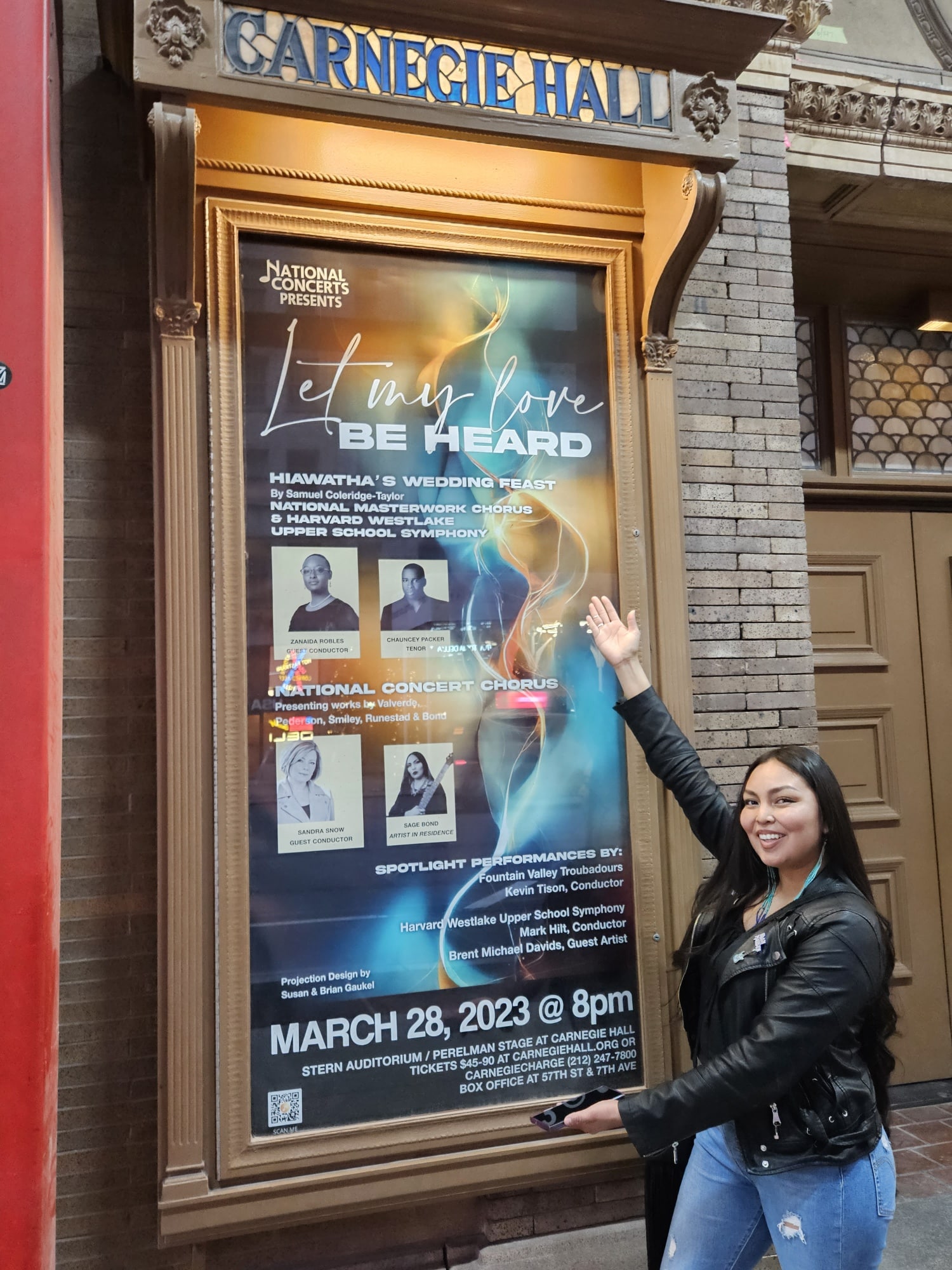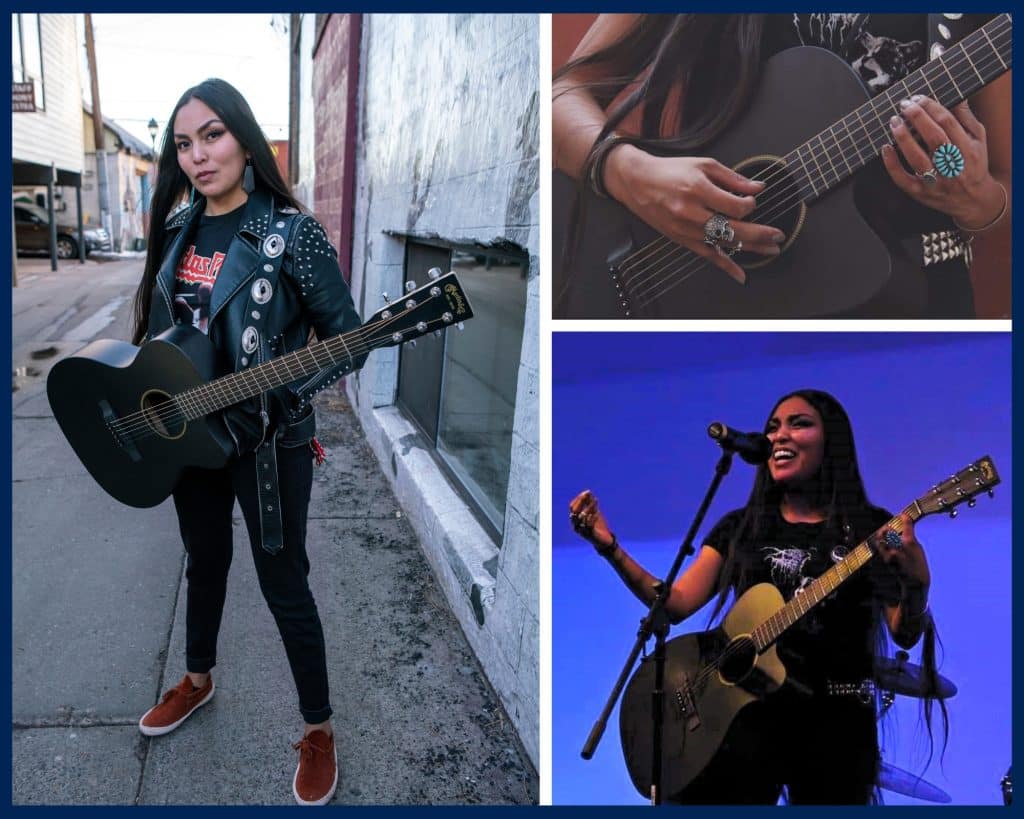“Yá’át’ééh,
Shí éí Sage Bond yinishyé. Tł’ízíłání nishłí. Ndeh bashishchíín. Tá’neeszahnii dashicheii. Chíshí dashinálí.”
“I am of the Manygoats clan. Born for the San Carlos Apache. Maternal grandfather is Tangle People clan, and my paternal grandfather is Chiricahua Apache.”

Bond wrote “Truth” in response to the death of George Floyd and the devastating impact of the COVID-19 pandemic on the Navajo Nation. The composition asks urgent questions about who is seen and heard, both historically and in the present day, touching on themes of justice, identity and resilience. Bond’s deeply personal and emotional connection to these issues comes through in the haunting and evocative melodies of the piece.
“Surrounding this time, I felt helpless,” Bond said. “Everything was put on hold, yet violence against people of color was still occurring.”
“Truth” was written to inspire the next generation and to call for unity against systemic racism and oppression. She hopes the song conveys the message of the immense challenges that marginalized communities face, highlighting their resilience while urging everyone to strive for a more inclusive and equitable future. Her music is a testament to the power of self-expression and the importance of telling one’s story in a world that often silences marginalized voices. Bond has taken a significant step forward in her career with her Carnegie Hall debut, though she’s been performing and studying music for years.
While pursuing her bachelor’s degree in music and a minor in psychology at Northern Arizona University, Bond has been busy working on multiple music projects with other Indigenous creators. She is an accomplished composer, having participated in the Native American Composers’ Apprentice Project (NACAP) and used her guitar skills to transcribe pieces for string quartets. Her first composition was performed at the Grand Canyon Music Festival in 2011. Since then, she has continued to explore her creativity through writing and performing music that draws from her experiences, culture and heavy metal influences.
Origin of musical odyssey: It all started with a guitar
Bond is originally from Tonalea, within the Navajo Nation, and her passion for music and her Navajo culture have been a constant source of inspiration throughout her life. Bond’s journey in music began at the age of nine when she first picked up a guitar. She learned a power chord and quickly realized the potential for creativity that music provided. By the time she was 12, she was learning songs by ear and eventually started singing. However, Bond initially struggled with singing in front of others due to shyness. Her mother helped her overcome this by taking her to karaoke, where she practiced in front of strangers, who eventually became her “karaoke family.” She became interested in the heavy metal music genre. She recalled her early attempts at mastering the challenging heavy metal-style growls and what she termed “Cookie Monster” vocals commonly used in heavy metal music. While these techniques initially strained her throat and likely tested her family’s patience during practice sessions, she persisted. Bond joined a local country band at the age of 13 and collaborated with musicians of various genres for several years. She learned to combine her singing and guitar-playing and began her singer-songwriter career.
“When I first picked up my instruments, I would have loved to have taken music classes or lessons, but music education was not offered in the schools I attended on the reservation,” Bond said. “I think that if I did have access to music education growing up, I might have been better prepared when starting at NAU.”
Bond’s experience with music education on the reservation was limited, but her experience with NACAP helped her see what was possible. Sage was introduced to the NACAP in high school and she and her classmates were hesitant to volunteer for a program because they hadn’t had any music courses at school or formal music education.
“At this time, I had been performing with the country band and picking up my own solo gigs over the weekend, so I built up the confidence to meet with the composer and was perplexed by the music theory terms they had used,” Bond said. “It felt like he was speaking a different language to me.”
Though initially intimidated by the music theory terms used by the composer-in-residence and finding it challenging to learn music theory, the project taught Bond how to write music and use notation software. She brought her acoustic guitar to school every day, which came in handy when she showed the composer her music and melodies and wanted to express it on staff paper. With the help of the composer, she was able to notate what she was playing on staff paper.
“I felt this program influenced my choice to continue my education in music. Before NACAP, I didn’t think I would ever have access to the environment of classical music,” Bond said. “For me, it seemed like a high society type of activity that a kid on the reservation wouldn’t think to dream about.”
The program culminated in a concert that featured the student composers’ pieces. The rehearsals were Bond’s favorite part of the experience because she was able to speak with the musicians playing her pieces and practice leadership skills.
“Having that exposure and access to work with the string quartets, telling them exactly how I wanted my piece played, opened my eyes to a whole new world of possibilities,” Bond said.
Bond’s dedication to learning and her guitar playing helped her communicate her ideas, leading to a successful collaboration. NACAP helped Bond grow as a composer and inspired her to bring music programs and music education to the reservation.
Bond at NAU: challenges and inspirations
Bond’s academic journey has not been typical; she took six years to complete her associate of arts degree at Diné College. She was unable to attend full-time and took two years off to focus on her music career, writing and performing, as well as participating in American Idol and The Voice auditions. Although she did not make it past the first round of auditions, it boosted her confidence and was a positive experience for her and her community. Bond released her first full-length LP album, “Prisoner,” the same year she graduated with her degree from Diné College.
Bond decided to attend NAU because it was the closest school to her that offered music education, despite the four-hour commute. Bond’s love for music and desire to help her community motivated her to pursue a music degree.
“I knew majoring in music at NAU was going to be a challenge for me due to not having access to music education on the reservation. I was very optimistic and felt my years of experience performing would aid my new educational journey. Still, I didn’t have any prior lessons or knowledge of music theory to prepare me for the audition,” Bond said.
Bond recalls the challenges of feeling out of place.
“I’m sure everyone has had this feeling at one point or another. It was unsettling to feel unfamiliar with music after dedicating a large chunk of my life to it,” Bond said. “This was mainly a mental battle and short-changing myself of all my hard work and accomplishments thus far. I had to remind myself that being in these places isn’t by chance and that there is a reason I am taking up those spaces.”
When she arrived at NAU, she found an invaluable mentor in Deborah Raymond, associate professor of voice at Kitt School of Music, now retired. Throughout her challenging first year, Raymond provided the support and guidance Bond needed to navigate her new path. Eventually, Bond honed her Cookie Monster technique, feeling an unmatched freedom and authenticity. Excited to share her progress, she eagerly showcased her cookie monster voice to her voice instructor, who, albeit with a humorous warning to “never do that again,” recognized the relaxed state of Jones’ throat and the lowered position of her larynx during the heavy metal growls. Raymond encouraged Bond to channel that same energy and freedom into her voice lessons, particularly for developing confidence in her head voice—something she had always lacked. This advice proved invaluable.
Bond found herself needing to stay late for an evening choir course, arriving home just before midnight, hastily eating dinner, working on homework, grabbing a few hours of rest and hitting the road again the next morning. Consequently, she frequently arrived late for her voice lessons. Recognizing the toll of Bond’s daily commute to and from classes, Raymond extended a kind offer—she provided Bond with a place to stay for a semester.
“I was able to keep up with my courses. I’m extremely grateful for people like Debbie, and I was so excited to tell her the news that I had the opportunity to perform at Carnegie Hall,” Bond said.
The future is musical and bright
Bond also noted the challenges of being an Indigenous musician while not making traditional Native American music. She recalled times when audience members expressed disappointment based on their expectations of her music and performance. She considers herself a modern or contemporary Native American musician, and while she doesn’t play traditional Native American music or sing in the Navajo language, she does pull inspiration from her background.
“I write from my experiences as an Indigenous person, whether it be from the heavy metal influence I grew up with, inspiration from Navajo creation stories or issues that I feel strongly about,” Bond said. “Living on the reservation is a unique experience. I grew up in a multi-generational home and a close-knit community.”
The first genre Bond learned to play on guitar was heavy metal, and it’s her favorite genre to play, incorporating that style into her pieces. Still, she loves being booked to play shows that include traditional Native American music performances so audiences can experience both cultural tradition and modern Indigeneity.
“During the times I felt like I wasn’t worthy or wasn’t the right person for the job, it was partially because I thought my upbringing on the reservation made me inferior to others who were non-native or that lived in the city,” Bond said. “When I’ve changed my perspective and gotten out of my comfort zone, I feel that each step I take has meaning, whether it be in education or my career; I handle those steps with much care.”
Bond’s journey as a musician and her time at NAU has been filled with challenges and triumphs. Her passion for music, her Navajo culture and her desire to help her community have been the driving force behind her achievements, and she hopes to inspire and empower the next generation of Native American musicians to pursue their dreams and share their stories with the world.
A significant part of her hopes is to bring music education programs, like those she wishes she had, to her community through her degree, and she’s well underway in accomplishing this goal. Currently working with the Heartbeat Music Project as a guitar teacher, Bond gives lessons to young Navajo students living on the Navajo Nation. Bond’s original composition “Truth” was a powerful and moving work that tackled urgent issues facing society today, and her dedication to promoting diversity and inclusivity in the arts is an inspiration to her community.
“What I’ve learned from my journey so far is that my love for music has been a driving force, picking me up and bringing me so many opportunities,” Bond said. “I’m accomplishing a lot of things that I would dream about; I just didn’t think they would happen this early in my career, but I’m grateful for it.”
Cynthia Gerber | NAU Communications
(928) 523-7341 | Cynthia.Gerber@nau.edu




